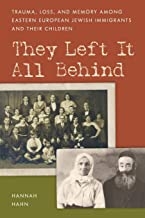They Left it All Behind - Book Review
The lead line on the cover of the paperback gives an overview of Hannah Hahn's well-researched study: trauma, loss and memory among Eastern European Jewish immigrants and their children. Much of what she writes applies to the current situation relating to the southern border of the United States and the attempted influx of immigrants from Central and South America. It also gives a clue to the background of other groups who left it all behind such as the Armenians, Greeks, Turks and Palestinian Arabs.
Hannah is a professional. She maintains a full-time private practice as a psychologist and psychoanalyst in New York City. She has a master's degree in psychology from Harvard University, a PhD in clinical psychology from Columbia University, and psychoanalytic certification from the Institute for Contemporary Psychotherapy, where she currently supervises candidates. Her publications and presentations are many. And it is no coincidence that Hannah and I share the same surname; her father and I are first cousins. Her paternal grandfather and my father were brothers.
Also on the cover is a photo of her mother's family and a photo of Hannah's paternal grandparents (my father's parents) - shtetl Jews from what was Austria-Hungary before WWI, Poland after WWI, Russia during WWII, and now the Ukraine.
The study is based upon interviews conducted by Hannah of family members, twelve women and ten men. For example, in my family Hannah interviewed my sister, now 96, who was born in Dresden, Germany. My sister and my mother immigrated to New York in 1930. My father had immigrated to New York in 1924. He sent them money until they were able to come to America. I am the New York baby. Hannah interviewed my wife whose mother immigrated to America from Brest-Litovsk, Poland. Her father immigrated to America from Pinsk, White Russia. They met and married in New York City.
My parents moved from the Ukraine to Germany after WWI. My father was a travelling door-to-door salesman in Germany and Western Europe. He was a successful business man but he felt the rising anti-Semitism. He saw the writing on the wall. Some of his siblings had immigrated to America prior to WWI; some of them remained in Europe and, sadly, Hitler got them. Anyway, my father did not have much of an education and he had to struggle in New York to make a living, like so many other immigrants. But his family in the New York area was very close and they helped each other.
No two of Hannah's interviews are alike. The stories vary but there is a common thread throughout. They left it all behind. Some were more successful than others. I loved the family pictures. There is a story behind each one of them. Other families immigrated to South Africa, the UK, Australia, Canada, Argentina, etc. Most left for a better life but something was left behind.
Hannah interviewed my wife, Lenore, revealing a story with a different twist. Lenore's mother was a young single woman, chosen by her mother to leave their home in Brest-Litovsk and join cousins in New York. Her mother's father was no longer alive. One of those cousins volunteered to personally return to Brest-Litovsk to marry Lenore's mother and then bring her to New York. It was a marriage of convenience. Her financial future would be secure and she would not be a burden on society. Once in New York, the plan was for them to get a divorce: her mother would get a job in the garment center and save enough money to help bring the rest of her siblings and her mother to America. But then came the quota system in America and they could not enter. But they could get into Argentina. The siblings put down roots in Argentina, went into business, married, had children, and there they remained. Some of those children married and now live in Israel. Some are still in Argentina, one is in Brazil.
A cute story emerged when one of Lenore's aunts came to visit her family in New York. Lenore's mother could not speak a word of Spanish and Lenore's aunt could not speak a word of English. So they spoke to each other in Yiddish with a word of Spanish thrown in and a word of English also thrown in. It was hysterical but it worked. Lenore's grandmother was the youngest of 16 children. Her grandmother had lots of nieces and nephews living in America and she travelled up and down the east coast from up-state New York to Florida to see most of them. Those in the Northeast made her a big farewell party and sent her back to Argentina loaded down with gifts.
Many left it all behind but in Lenore's mother said she would never go back to Poland and never again speak a word of Polish. She was not alone in her thinking. What she left behind were memories, some good, some bad.
Hannah wrote a masterful book which will resonate with many people. I found it very informative.








Comments